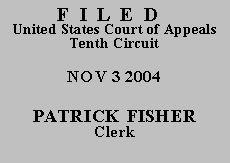

|
WENDEL ROBERT WARDELL, JR.,
v.
DONICE A. NEAL, Superintendent;
JOSEPH G. ORTIZ; IRVING G.
JACQUEZ; A. F. STANLEY;
DEBRAH C. ALLEN |
|
Before EBEL, MURPHY, and McCONNELL, Circuit Judges.
The district court denied Wardell relief on his first two claims on the basis that they were untimely under 28 U.S.C. § 2244(d)(1) and Wardell had failed to demonstrate any circumstances that would support the equitable tolling of the one-year limitations period. See Miller v. Marr, 141 F.3d 976, 978 (10th Cir. 1998). The court also denied Wardell's third and fourth claims, concluding that Colorado's discretionary parole scheme did not create a liberty interest in parole. Thompson v. Riveland, 714 P.2d 1338, 1340 (Colo. App. 1986). Finally, the district court determined that Wardell's fifth claim failed because the state parole board's decision to deny parole was based on a constitutionally valid ground, i.e., Wardell's disciplinary conviction. See Wildermuth v. Furlong, 147 F.3d 1234, 1236 (10th Cir. 1998) ("[W]here the denial of parole . . . rests on one constitutionally valid ground, the Board's consideration of an allegedly invalid ground would not violate a constitutional right." (quotation omitted)).
Wardell now seeks a certificate of appealability ("COA") to enable him to appeal the district court's denial of his § 2241 application.(2)
A COA may issue "only if the applicant has made a substantial showing of the denial of a constitutional right." 28 U.S.C. § 2253(c)(2). "A petitioner satisfies this standard by demonstrating that jurists of reason could disagree with the district court's resolution of his constitutional claims or that jurists could conclude the issues presented are adequate to deserve encouragement to proceed further." Miller-El v. Cockrell, 537 U.S. 322, 327 (2003). This "requires an overview of the claims in the habeas petition and a general assessment of their merits." Id. at 336. Further, when the district court denies a habeas petition on procedural grounds without reaching the prisoner's underlying constitutional claim, a COA should issue only when the prisoner shows, at least, that jurists of reason would find it debatable whether the petition states a valid claim of the denial of a constitutional right and that jurists of reason would find it debatable whether the district court was correct in its procedural ruling. Slack v. McDaniel, 529 U.S. 473, 484 (2000).
This court has reviewed Wardell's application for a COA and appellate brief, the district court's order, and the entire record on appeal pursuant to the framework set out by the Supreme Court in Miller-El and concludes that Wardell is not entitled to a COA. The district court's resolution of Wardell's claims is not reasonably subject to debate and the claims are not adequate to deserve further proceedings. Accordingly, Wardell has not "made a substantial showing of the denial of a constitutional right" and is not entitled to a COA. 28 U.S.C. § 2253(c)(2).
This court denies Wardell's request for a COA and dismisses this appeal. Wardell's motion to proceed in forma pauperis on appeal is denied.
ENTERED FOR THE COURT
Michael R. Murphy
Circuit Judge
1.Although Wardell argues that he was unable to timely respond to the district court's order requesting the parties to supplement the record with evidence regarding statutory tolling of the one-year limitations period, it is clear from the district court's order that Respondents provided the court with the documentation necessary to resolve the issue. Further, Wardell has failed to identify or describe the additional documents he wanted the court to consider.
2.Although Wardell is now incarcerated in a federal prison pursuant to a pre-trial detention order, at the time he commenced this § 2241 proceeding he was a state prisoner. Further, all of his claims arise from state disciplinary and parole proceedings. Accordingly, Wardell must obtain a COA before he is entitled to appeal the district court's ruling. See Montez v. McKinna, 208 F.3d 862, 869 (10th Cir. 2000) ("[T]his court reads § 2253(c)(1)(A) as applying whenever a state prisoner habeas petition relates to matters flowing from a state court detention order.")